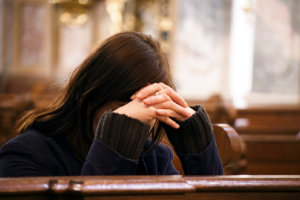While Americans as a whole are becoming less religious, those who still practice a faith are more committed than ever to their beliefs, according to a new study released by the Pew Research Center.
The 2014 U.S. Religious Landscape Study, released Tuesday, found that more religiously affiliated adults read scripture regularly and participate in small religious groups compared to seven years ago.
Additionally, 88% of religiously affiliated adults say they pray daily, weekly or monthly - the same percentage that reported regular prayer in the first landscape study in 2007.
"People who say they have a religion - which is still the vast majority of the population - show no discernible dip in levels of observance," said Alan Cooperman, director of religion research at Pew.
"They report attending religious services as often as they did a few years ago. They pray as often as they did before, and they are just as likely to say that religion plays a very important role in their lives," he added. "On some measures there are even small increases in their levels of religious practice."
However, religious affiliation overall has decreased about three percentage points in recent years, primarily due to the growth in the share of "nones" who say they don't believe in God. About 77% of adults surveyed describe themselves as religiously affiliated, a decline from 83% in 2007.
Pew researchers believe these drops are due to the dying off of older believers, and a growing number of Millennials - those born from 1982 through the early 2000s - who claim no religious affiliation.
The researchers also found more general spirituality is on the rise, with 6 in 10 adults saying they regularly feel a "deep sense of spiritual peace and well-being," up seven percentage points since 2007. The number of people who experienced a "deep sense of wonder" about the universe also increased about seven percentage points.
Six in 10 adults and three-quarters of Christians believe the Bible or other holy scripture is the word of God. About 31% overall - and 39% of Christians - believe it should be interpreted literally.
"We should remember that the United States remains a nation of believers with nearly 9 in 10 adults saying they believe in God," said Gregory Smith, Pew's associate director of research.
The survey also showed a dramatic shift in Christian attitudes toward gay Americans: The number of evangelical Protestants who said they agreed that "homosexuality should be accepted by society" jumped ten percentage points between the 2007 and 2014 studies - from 26% to 36%. The increase for Catholics was even greater, from 58% to 70%. For historically black Protestant churches, acceptance jumped from 39% to 51%.
On abortion, attitudes remained steadfast, however. The study shows that 53% of Americans believe abortion should be legal in all or most cases, with views within denominations shifting little since the first landscape study.
For the study, researchers interviewed 35,071 Americans, and the study has a margin of error of plus or minus less than one percentage point.The portion of the survey released Tuesday, which focuses on beliefs and practices, is the second of two parts.
The first, released in May, found that the nation is significantly less Christian that it was seven years ago, much to the dismay of many believers across the country.
However, Dr. Russell Moore, president of the Ethics and Religious Liberty Commission of the Southern Baptist Convention, argued that the seeming disappearance of Christianity and rise of secularism in the United States is, in fact, "good news" for the church.
"Christianity isn't normal anymore, and that's good news. The Book of Acts, like the Gospels before it, shows us that the Christianity thrives when it is, as Kierkegaard put it, a sign of contradiction. Only a strange gospel can differentiate itself from the worlds we construct. But the strange, freakish, foolish old gospel is what God uses to save people and to resurrect churches (1 Cor. 1:20-22)," Moore wrote in an op-ed titled "Is Christianity Dying?" published on his website.
He went on to explain that the report simply shows that there are fewer " incognito atheists" and more honest atheists in America today. "We do not have more atheists in America. We have more honest atheists in America. Again, that's good news. The gospel comes to sinners, not to the righteous. It is easier to speak a gospel to the lost than it is to speak a gospel to the kind-of-saved. And what those honest atheists grapple with, is what every sinner grapples with, burdened consciences that point to judgment. Our calling is to bear witness."

















